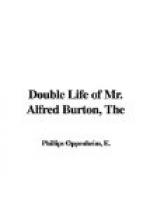“So this is the room,” he remarked. “Dashed if I’ve ever been in it! It wants cleaning out and fumigating badly. What’s this?”
He picked up the sheet of paper, which was lying exactly as Burton had left it. Then he lifted up the little dwarf tree and looked at it.
“It is finished. The nineteenth generation has triumphed. He who shall eat of the brown fruit of this tree, shall see the things of Life and Death as they are. He who shall eat—”
“Well, I’m d—d!” he muttered. “What’s it all mean, anyway?”
“Try a brown bean,” Burton suggested softly. “They aren’t half bad.”
“Very likely poison,” Mr. Waddington said, suspiciously.
Burton said nothing for a moment. He had taken up the sheet of paper and was gazing at the untranslated portion.
“I wonder,” he murmured, “if there is any one who could tell us what the other part of it means?”
“The d—d thing smells all right,” Mr. Waddington declared. “Here goes!”
He broke off a brown bean and swallowed it. Burton turned round just in time to see the deed. For a moment he stood aghast. Then very slowly he tiptoed his way from the door and hurried stealthily from the house. From some bills which he had been studying half an hour ago he remembered that Mr. Waddington was due, later in the morning, to conduct a sale of “antique” furniture!
CHAPTER VI
A MEETING WITH ELLEN
The clearness of vision which enabled Alfred Burton now to live in and appreciate a new and marvelous world, failed, however, to keep him from feeling, occasionally, exceedingly hungry. He lived on very little, but the weekly amount must always be sent to Garden Green. There came a time when he broke in upon the last five pound note of his savings. He realized the position without any actual misgivings. He denied himself regretfully a tiny mezzotint of the Raphael “Madonna,” which he coveted for his mantelpiece. He also denied himself dinner for several evenings. When fortune knocked at his door he was, in fact, extraordinarily hungry. He still had faith, notwithstanding his difficulties, and no symptoms of dejection. He was perfectly well aware that this need for food was, after all, one of the most unimportant affairs in the world, although he was forced sometimes to admit to himself that he found it none the less surprisingly unpleasant. Chance, however, handed over to him a shilling discovered upon the curb, and a high-class evening paper left upon a seat in the Park. He had no sooner eaten and drunk with the former than he opened the latter. There was an article on the front page entitled “London Awake.” He read it line by line and laughed. It was all so ridiculously simple. He hurried back to his rooms and wrote a much better one on “London Asleep.” He was master of his subject. He wrote of what he had seen with effortless and sublime




